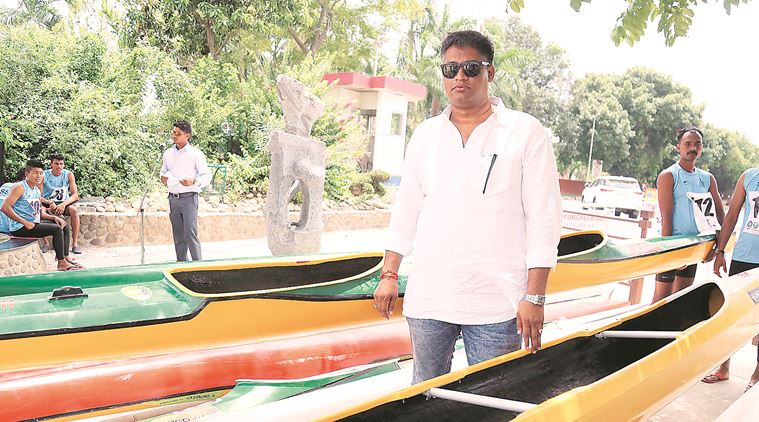 Prashant Kushwaha at Sukhna Lake Friday. (Express photo by Sahil Walia)
Prashant Kushwaha at Sukhna Lake Friday. (Express photo by Sahil Walia)
On the concluding day of Seventh National Dragon Boat Championships and Kayaking and Canoeing Federation Cup on Saturday, Prashant Kushwaha, Secretary General of Indian Kayaking and Canoeing Association (IKCA), was all praise for Chandigarh, which hosted the events for the first time with more than 650 players competing at Sukhna Lake from June 27 to 30.
“It was for the first time in India that races with six dragon boats were held at a single venue. Earlier, we had races with a maximum of four boats. Chandigarh has the right infrastructure. Competing in a six-lane event has been a different experience for the competitors. More than 650 players competed in the championships and the growth in the numbers of teams has been encouraging. The dragon boat race players will compete in the Asian Championships in China next month and it will also help them ahead of the Asian Games,” said Kushwaha.
It was the one of the highest number of athletes competing in the seven-year history of the championships. While canoe/kayak sprint national championship has been happening for the last 28 years, growing competition in this format too has attracted interest.
The Indian players have so far won a total of 16 medals at the world and Asian-level canoe/kayak competitions, apart from the dragon boat races. Last year, Madhya Pradesh rowers Champa Maurya and Prince Parmar won silver medal in mixed doubles C-2 category in Asian Canoe Slalom Championships in Thailand. The duo had secured a credible fourth-place finish in the Canoe Slalom World Cup-I held in Czech Republic in June last year.
Siji Kumar and Johnny Rommel had won India’s only medal in the sport in the 1992 Asian Games in Hiroshima, but Kushwaha is confident that the Indian team can end the drought in this year’s Asian Games. “Our rowers have done well at the Asian-level recently and the mixed team of Champa Maurya and Prince Parmar won the silver medal in last year’s Asian Championships. The fourth-place finish in last year’s World Cup I also boosted their confidence. In the canoe/kayak sprint nationals in Bhopal, we saw more than 800 players competing. In this year’s Slalom national championships, we saw 59 players. The number is less in comparison to other events, but slowly more players are showing interest in the sport. One needs rapid water streams for slalom events and it is an enduring sport. Most of our top players come from places like Pondicherry, Kerala, Madhya Pradesh and lately players from Haryana too have done well,” added 40-year-old Kushwaha.
While the International Canoe Federation’s (ICF) annual calendar consists of more than 30 events, the Indian teams compete in only four to five. Kushwaha was of view that the government should support Indian players for competing in more tournaments. “Currently, the Indian teams compete in (only) four to five tournaments, conducted by the ICF. We want the government to help us get more exposure to the players and they should get a chance to compete in 15-20 events throughout the year. We currently have a French coach for slalom. What we need is more training of the Indian coaches abroad and in India. This is an expensive sport and requires a lot of technical knowledge for the players. One needs proper infrastructure like boats, which can cost from Rs 20,000 to Rs 20 lakh, power boats and life-saving equipment. In India, lot of parents have their concerns about drowning, so we need to educate the masses too about these Olympics events,” concluded Kushwaha.